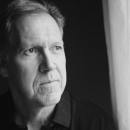Nanette Kirsch has just released her new book DENIAL: Abuse, Addiction, and a Life Derailed. DENIAL is the true-life story of David Wagner, a married father of five children and millionaire entrepreneur. He gives generously to family, friends, and causes he believes in, and he is easily the funniest guy in the room. Yet beneath his boisterous, carefree shell, the lingering effects of sexual abuse he suffered by a priest at age 12 lure him into a secretive double life that ultimately consumes him.
David prays daily for forgiveness, but never feels worthy of God's gift of grace. Fear fuels his denial, the fear that even God can't love the broken, sinful person he has become...until one day the truth will be denied no more.
DENIAL is a gritty, yet ultimately hopeful true-life story, told to inspire survivors of childhood sexual abuse to break its spiritual stronghold and embrace an abundant life of wholeness and peace.
To purchase the book, click here.
Q: Nanette, thanks for doing this interview with us. Let's begin with yourself, tell us more about yourself.
Sure. I have been married to my husband, Craig, for 27 years. We have four young adult children, two of whom are adopted from Korea. We follow Jesus. I am a self-employed marketer who works primarily with software startups. And in my free time I pen a blog called Faith Runner.
Q: What prompted you to write a book about sexual abuse in the church?
I had finally addressed lingering effects of sexual abuse I suffered by a high school teacher and in that process God showed me how abuse uniquely harms one's ability to experience intimacy and trust, not just in our human love relationships, but also in our relationship with him. Once I understood that, and allowed the Lord to heal that in me, he called me to this book. It's based on the true story of my friend and how sexual abuse by a priest led him into a profound, and ultimately deadly, double life, a life we never understood until after his death in 2009.
Denial was released in June 2017. Then this past August the Pennsylvania Grand Jury report was released, and Denial became the first book based on one of the 1000 victims profiled in that report. It speaks to the heart of the report - the fact that spiritual leaders abused their power for selfish, physical gain, and in doing so destroyed a generation of young believers, physically, emotionally and spiritually.
Q: The book revolves around David Wagner. How did you meet him and how did this journey lead you to this book?
My husband and I met "David" in college. We remained close friends with him, his wife and children throughout our lives. His suicide in 2009 remains among the most shocking and saddest events in our lives.
It was one of those moments when you become acutely aware that things in life often are not as they appear. David was a bright, successful, BIG personality. He was literally the funniest guy in the room, and that's coming from me, whose husband thinks he is the funniest guy in the room.
It was only after his death that the shocking details of his life began to come to light; his childhood sexual abuse by a trusted priest, repeated targeting throughout high school, and the later denial that propelled him into a dark and dangerous double life. His widow asked me to write his story shortly after his death in 2009, but at that time I did not feel I had a story to tell.
It was only after dealing with my own past abuse and coming to understand sexual abuse as a powerful spiritual weapon for separating victims from knowledge of God that I felt compelled to write his story.
My chief purpose was to share the truth of his experience in a way that would help his five young children reconcile the loss of their father with grace and mercy, and gain confidence in his great elove for each of them.
My second goal was to write a compelling story about the danger of denial that would help other survivors of sexual abuse - and those who love them - understand the symptoms and risk of living in denial, which far too often can be lethal.
Q: How does abuse often affect the lives of the victims?
In the immediate aftermath of the trauma, victims almost always blame themselves. They question what they did to attract this unwanted attention. If they experience physical arousal, as many do, they experience guilt and shame, and a turbulent conflict between pleasure and pain ensues that can last a lifetime.
After the abuse ends, if victims live in denial as David Wagner did, they are plagued by self-contempt. There are three lies many survivors of sexual abuse carry into adulthood:
1) Intimacy is the enemy - Once the abuser is gone, victims' bodies and minds seek to protect them from anything that resembles the violation of abuse. Close, trusting relationships feel dangerous, and healthy sexual relationships are often unattainable.
2) God is not good - This is especially true when abuse is inflicted by a spiritual leader, one who twists ideas of God and sexuality in order to get victims to comply. Many victims, as adults, question how a good God could allow an innocent child to be victimized.
3) I am not worthy - Victims often believe they are not good because they falsely accept responsibility for the crimes committed against them.
Adult men who are struggling to cope with past sexual abuse often face relational/marital problems, substance abuse, depression and anxiety, homophobia, pornography addiction, other sexual addictions and risk of suicide.
Q: How can this book help victims who have had been abused?
My hope is that the book will help victims see the danger of living in denial of past sexual abuse and take the first, brave steps to tell someone safe and seek help. The last chapter of my book and the website offer resources to help survivors get started on the road to recovery.
My other hope is that survivors will come to recognize sexual abuse for what it is, a weapon of the enemy, designed to deceive them into believing God is not good and that they are unworthy of his love and redemption. In the light, those lies lose its power on them, and they can be free to experience the renewing comfort of God's spirit.
Q: How can this book help the church and those in authority?
I've shared this book with at two Catholic Bishops so far, both active in responding to these problems in the church. One of them, Bishop Lawrence Persico of Erie, Pa., wrote to me and said, in part: "I read your book. It is well-written and helped me to have a better understanding of the experiences of victims and the pain they go through. With the Lord's help you are providing a real ministry for victim survivors. My prayers are with you as you continue your good work."
Q: How do you respond when people ask where is God when someone in authority, especially a Priest, is the abuser?
That question sits at the heart of my book. As an adult, David cries out to God repeatedly for rescue and redemption that he never finds. The reason, I believe, is because the abuse prevented him from being able to feel God's love.
The answer I found in writing this story is that God is with us when we suffer. His anger is aroused by injustice, and in scripture he makes it clear that he is particularly angered by those who harm the innocent and vulnerable among us.
The most famous verse, of course, is Matthew 18:6: "But whoever causes one of these little ones who believe in me to sin, it would be better for him to have a great millstone fastened around his neck and to be drowned in the depth of the sea."
But there are others:
-
In Matthew 25:40: "And the King will answer them, 'Truly, I say to you, as you did it to one of the least of these my brothers, you did it to me.'"
-
Matthew 18:30: "See that you do not despise one of these little ones. For I tell you that their angels always see the face of my Father who is in heaven."
-
Mark 9: 36-37: "And he took a child and put him in the midst of them, and taking him in his arms, he said to them, 'Whoever receives one such child in my name receives me, and whoever receives me, receives not me but him who sent me.'"
I believe we are seeing God's wrath against the Catholic church, which has aided and abetted a culture of sexual abuse for centuries. Christ's church is comprised of people who confess Jesus as their Savior; it is not a denomination or organization. I believe God's will is not stop until the evil is routed, even if the church must fall to do so.
Q: What do you hope people understand about living through abuse? About loving someone who has been abused?
One in four women and one in six men is sexually abused by age 18. That means we all know and love someone who has been victimized.
I want survivors to know that they are not alone. As scary as it is, speaking out about what happened to you - no matter how long ago - is safer and more life-giving than living with the lies. In the light, the lies you've lived begin to lose power. You'll find strength and comfort among others who know the journey you've been on.
For those who love a survivor - spouse or family member - please listen and learn. Sexual abuse strikes deep in a person's heart and soul. They need to be heard, not questioned. The work of recovery can be a lifelong process and usually requires professional intervention to untangle intimacy from spiritual and physical abuse. Be patient. Be kind. Love unconditionally.


















